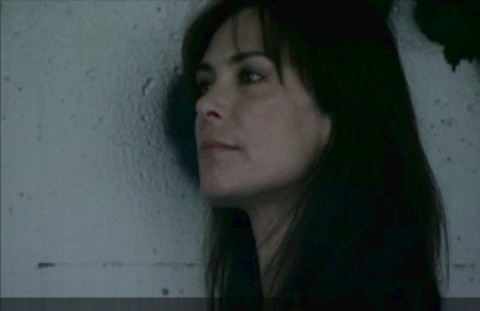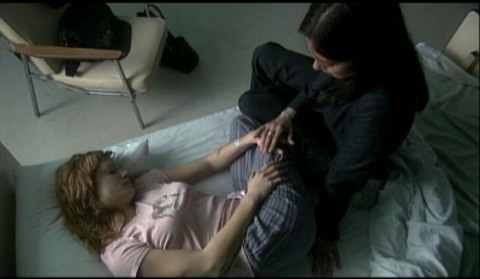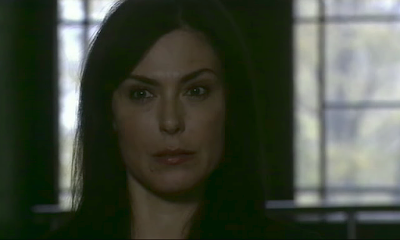
* If you haven't been following the last epsiodes, you'd be better off waiting for the reruns (starting on August 24) or the DVD.
* Filming of season 3 starts in September.
***********************
[Durham County] is not really about the suburbs. If there's any tincture of truth in that definition, then Durham County is about a suburb of the mind, and a sick mind at that. It is great, grown-up TV (it will air later on conventional TV). Let's classify it as that. It's disturbing and bleak, and it's wrong to reduce it to a drama about the suburbs. It's about angry, unhappy people who could be anywhere.
What's really striking about this second season is that while it follows in part the same plotline, it offers a reverse picture of evil and malice. The first was anchored in male rage. This time, the devil is a depressed woman filled with pain and loathing [...]
This second Durham County is as sumptuously dark and bleak as the first. But if that was about the mania of male rage, this season has been emphatically about the ferocity of female duplicity and destructiveness. In large part, it's been dominated by one female figure, Pen Verrity (Michelle Forbes), a forensic psychiatrist who, it emerges, has more anger and neuroses that all the patients she's analyzed, combined.
In fact, if you've been watching really good TV this summer, and that means watching True Blood and Durham County, you've seen a lot of Forbes playing women who are sugar-sweet on the surface and bitter agents of evil underneath. Forbes currently has a monopoly on such appalling women. And she's very, very good at it.
The Pen Verrity character is an excellent creation, a woman who could be a child murderer and who we know is responsible for the shocking murder of another woman. But she's also a cauldron of self-loathing. In one scene this season, she behaved in a manner that was a deliberate echo of a stunning scene of self-mutilation in Ingmar Bergman's movie Cries and Whispers [...]
This Durham County isn't about Ray. It isn't even about Mike Sweeney. It's about Pen Verrity and it's about Mike's daughter Sadie. As Sadie, Leboeuf has been marvellously good – a teenaged girl who has been through traumatic events but is shrewd enough to keep her own counsel and make her own decisions. In tonight's finale, everything will really depend on the Sadie character.
Source: theglobeandmail.com

Tonight's finale, directed with sensitivity and emotional grace by Rachel Talalay, is both unpredictable and in keeping with Durham County's solemn, introspective tone. The climactic courtroom scenes are nicely understated: There are none of the histrionics viewers have come to expect of typical TV dramas, but the tension is no less palpable for it. This is tough, uncompromising drama.
Sure, Durham County is disturbing -- intentionally so -- and unpleasant to watch. And I could have done without the artsy, horror-film ending. But it's worth seeing -- for its topical, important story, and for the fine acting. This is the series that won last year's Gemini Award as Canada's best TV drama, and based on tonight's evidence it's hard to imagine it won't win again.
Source: edmontonjournal
Update
»» Screencaps of episode 6 are online
Alors que la date du procès approche, et qu’on ne sait pas si Sadie va oui ou non témoigner, Mike fait semblant d’être toujours épris de Verrity, encore psychiatre auprès de sa fille, qui a récupéré la garde de son fils, et se met à voir Ray Prager. Ce dernier point apparaît un peu comme une facilité scénaristique. Au départ, cela tombe un peu comme un cheveu sur la soupe, et la fin viendra appuyer son utilité, donnant à tout ceci des tournures de raccourcis [...]
On peut alors se tourner vers le Dr. Verrity, et là, l’épisode, concentré en grande partie sur Sadie, faiblit fortement de rythme et aligne assez mal ces scènes, perdu dans la conclusion de cette intrigue. Elle se trouve liée à Ray Prager, une façon très malhabile d’ouvrir sur la toute fin quelques portes, alors que Penn a trouvé un moyen de mettre un terme à ses souffrances, sans le faire elle-même. Assez lâche, mais suffisamment en accord avec sa personnalité plus manipulatrice et passive, qu’active – seule sa rage semble réellement la pousser vers ses plus sombres démons, et ce ne sont pas ceux qui l’auraient conduit à cette fin.
Source: critictoo.com
--OH, SADIE. Laurence Leboeuf needs to win a Gemini for this show. CONUNDRUM: Michelle Forbes also needs to win a Gemini for this show, leaving me with an IMPOSSIBLE DILEMMA re: who to root for [...]
--I like that, even with Pen's "confession", it was left ambiguous as to the mechanics of how Bonnie got into the pool: it's possible to read the progression of photos as Pen simply watching (and DOCUMENTING, PEN, WTF) Bonnie fall in, or as Pen moving closer because she would eventually, actively push her. Not that she's less culpable one way or the other for Bonnie's death--'cause she's wholly culpable, even if she didn't deliberately aggravate Bonnie's salt diabetes to the point where the poor kid tried to use the swimming pool for drinking water--but I think the uncertainty is an excellent narrative trick: we can know Pen killed her daughter with each act that led up to Bonnie's actual drowning, and we can know she killed her by not hauling her out of the pool in time to resuscitate her, but we can't be sure she's directly responsible for Bonnie being in the pool. (Again, obviously, she's guilty as hell: as with Glenn, who I'll get to momentarily, sometimes the passive crime is equal to--sometimes greater than--the active crime. I just like that, in wrapping up the story of Bonnie's murder/Pen's psychology, the show's denied us that one little absolute.) [...]
--Tom gets to keep his title of The Only Good Cop In Durham County*, as Glenn did indeed turn out, like all Ray's other cronies, to be operating from a very wrong premise in life. Namely, that if you only watch your buddies beat, rape and murder a woman, you're not culpable for what happened to her. - *The Only Good Man, one might argue. Discussion about the perceived political/social message behind the all-female showrunners' decision to make The Only Good Man In Durham County a gay man.
Source: serrico.livejournal.com

